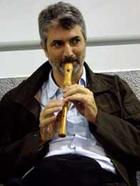
Professor at the Department of Social and Cultural Anthropology of the UNED since 2004, he is currently in charge of the twelve grades of Social Anthropology I (Philosophy degree), Urban Anthropology (degree of Anthropology, with Fernando Monge), Ethnographic Knowledge: Cognitive Anthropology and Symbolic (degree in Anthropology, with María García Alonso) and Ethnomusicology (Teacher Training, with Rafael Martín Castilla). He also teaches, together with Professor Monge, the subject of Anthropological Theory and Criticism of the Contemporary World in the Anthropology Master's Degree. He has also taught master and doctorate courses in programs at the University of Salamanca, the UAB, the UCM, the UAM-I and the ESMUC. He trained in psychology (UCM degree), music (middle grade RCSMM) and anthropology (doctorate UNED). From 1997 to 2004 he taught Ethnomusicology at the University of Salamanca. He has assisted as a guest researcher at the universities of Valle (Cali), UAM-I (Mexico), Chicago (The University of Chicago), California (UCSD) and Paris-Est (Institut Français d'Urbanisme). He has done field work in Valle del Jerte (Cáceres, 1989-93), Madrid (1982-2014), Mexico City (1995), Bogotá (1996) and Montevideo (2014). His research deals with various symbolic manifestations of popular culture (music, parties, marches, orality, rituals). He has also worked on risk issues and expert systems in the late modern context. He is currently developing ethnography on the poetics of daily life in the intimate space. As editor or co-author, he has contributed to works such as Rituals and social process (Ministry of Culture, 1991); Revitalizing European Rituals (Routledge, 1992); Social Experience and Anthropological Knowledge (Routledge, 1994); The emerging city (UNED, 1996); Political Rituals (IASSA Göteborg, 1996); Culture and communication in Mexico City (Grijalbo, 1998); Musical cultures (Trotta, 2001); The smile of the institution (CERASA, 2006); Symbols in the city. Readings of urban anthropology (UNED, 2006), Texts of contemporary anthropology (UNED, 2010), Youth, urban cultures and digital networks (Ariel, 2012). His works address the urban from a symbolic and performative perspective, trying to untangle the processes of individuation and repersonalization typical of late capitalism. He directs the Urban Culture group of the UNED, which investigates the metropolitan transformations of Madrid linked to globalization.








